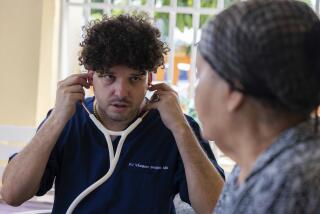He Follows His Heart to the Front Lines
There hasn’t been much time for celebrating, for resting on laurels, for basking in the glow of reflected glory these last few days. There were rounds to make, surgeries to perform, eager young doctors to educate.
But there has been a profound sense of satisfaction coloring Dr. Peter Meade’s days--ever since Friday’s announcement that this year’s Nobel Peace Prize goes to Doctors Without Borders, a pioneer in providing medical and humanitarian relief to neglected regions of the world.
A Los Angeles surgeon, Meade is part of an international corps of physicians, nurses and medical technicians on the front lines for Doctors Without Borders.
Two years ago, Meade spent a three-month stint in Sri Lanka, ministering to land-mine victims in the midst of one of the world’s most bloody and intractable civil wars. Next month, he leaves on his second mission, to either Kosovo or Sierra Leone--whichever is most in need of his surgical skills.
The Nobel Peace Prize, he says, “is an honor for all of us associated with Doctors Without Borders.
“But more than that, it’s a validation of the need for an organization like this--one that’s driven strictly by humanitarian need to deliver medical care to people who don’t have access, who don’t have a voice.
“And, for me, that’s what being a doctor is all about.”
*
In 29 years, Doctors Without Borders has grown from a cadre of rebellious young French physicians, frustrated by the political limitations placed on their relief work in Biafra, into one of the largest, most influential humanitarian aid groups in all the world.
Today, the group has offices in 18 countries, has served more than 80 nations and has 2,000 medical workers on its roster of volunteers, ready to travel to disasters around the world.
Meade was a newly minted surgeon, a few years out of medical school, on the staff at Martin Luther King/Drew Medical Center in Watts when he read a magazine article about the group.
“I put it up on my bulletin board, thought that was something I’d like to do someday. And it stayed there for about six years.”
Finally, he amassed enough vacation time to offer a three-month commitment to a foreign posting. He called the group, filled out an application and got a return call right away.
“They said, ‘Do you want to go to Jaffna?’ I said, ‘Sure. Where’s Jaffna?’ ”
Jaffna is a city in the northern part of Sri Lanka, an area devastated by the country’s 15-year-old civil war.
“I had no idea what I was walking into,” he said, until he met two Sri Lankan women at a medical convention a few weeks later and told them of his plans. “They began wailing, screaming, ‘You can’t go there! It’s too dangerous!’ ”
But he went, and after three months serving with doctors and other medical personnel from around the world--caring for men whose legs had been blown off by land mines, women dying from bullet wounds, children crushed by falling walls when their apartments were leveled by blasts--he came back to Los Angeles fortified.
“Here, you tend to worry about things like how much you’re making, are you piling up enough possessions. It’s like being on a treadmill. There will always be someone else making more [money]; it’s a race you can’t win.
“There, I was surrounded by people focusing on ‘Let’s take care of people. Let’s improve the hospital and teach the students. Let’s leave this place better than we found it.’ It puts everything else back in perspective.”
*
It’s not an option for everyone, this gallivanting around the world, parachuting into danger zones to minister to disaster victims. It is difficult for most physicians to find the time such a commitment requires. At 47, Meade is still single and has no family here to answer to.
He understands that “this kind of life is not what most women have in mind when they’re dating a doctor.” He has a modest home in San Pedro, drives a Saturn, doesn’t even own a cellular phone.
He’s not unhappy with the way his career has gone: He’s director of the surgical intensive care unit at Martin Luther King/Drew Medical Center and enjoys teaching surgery to residents. Every month, he flies to Mexico with another group of physicians to spend weekends volunteering in small Mexican medical clinics.
But sometimes, he admits, he feels out of place among his physician associates.
“I live pretty close to the ground,” he says.
The Nobel Prize provides a kind of vindication.
“It strengthens me,” he says. “Lets me know I’m on the right track following what’s inside of me instead of all those forces outside telling me what I ought to be: That a doctor ought to be wearing certain clothes, driving a certain car, living in a certain part of town.
“This is the life that works for me.”
Sandy Banks can be reached by e-mail at sandy.banks@latimes.com.
More to Read
Sign up for Essential California
The most important California stories and recommendations in your inbox every morning.
You may occasionally receive promotional content from the Los Angeles Times.










